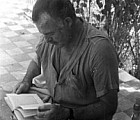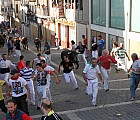Hemingway the Expat with Hadley Audio, “You had life in the raw”

Hi Friends, I’ve added some thoughts to this essay I wrote while living in Chile a few years ago. I’ve been thinking about those of you who are stomping around Italy this week, dreaming about Hemingway’s days there long ago. You will also find a Hadley audio clip at the end. I hope you enjoy it ~

I’ve been thinking a lot about expats lately, and how much of his life Ernest Hemingway spent in foreign countries. Perhaps I’m thinking about this because I am writing this post from Chile, where the sights and sounds are so different from home. Most days, our windows and doors are opened wide to a tiled terrace overlooking the sea. As I write, I take in the amazing variety of new sounds in my environment; once in a while the toy salesman goes by with his cart, which pumps out toy music just like a jack-in-the-box. Workmen pass in the street below, whistling and singing. Lumbering buses shudder to a stop and cars honk impatiently. Now and then seagulls swoop by and drop shells with a clatter on the terracotta tiles as they fly overhead, screeching. One time a bird dropped the entire intact skeleton of a fish on our terrace, the bones picked clean.
I can’t help thinking that traveling as much as he did gave Hemingway the heightened senses that helped make him the maestro writer that he was.
Hemingway is forever associated with travel and the places he loved. It isn’t simply that his travels have given him a backdrop for the stories and novels set in places like Africa, Paris or Spain. I think his travels gave him fresh ears and eyes, a quality of listening and seeing and living at the edges of each culture he was in.
In a way, Hemingway was always that wonderful young reporter from the Star, delighted to be alive and experiencing new things, more than willing to go forward into new territory and tell the folks back home what he saw. His early work as a reporter gives us a glimpse of how he was shaped as a writer, aware that he was experiencing things that others might never know, aware of the moment; the way the snow glistened on Christmas morning in Switzerland, the old faces of fishermen in Spain. Even later, as a seasoned writer contributing essays and letters for Esquiremagazine, he reports on Key West, his own locale and townspeople, with the amusement, wonder and fascination he would have had for a foreign country (which it kind of was, actually).

From the moment Hemingway set foot in Italy at the age of 18 to become part of the Red Cross, his travels gave him a first hand glimpse into history. He lived in extraordinary times, experiencing the devastation of World War 1 and 2, the Spanish Civil War, the Greco-Turkish war in Constantinople, the Revolution in Cuba, and more. Scenes from each of these historical events made their way into his writing and surely into his soul; fascism under Mussolini and Franco, years of poverty in wartime and afterwards, the death of friends and fellow soldiers in all three wars and the destruction of the land, people and places he knew and loved. He often saw the direct results of history reflected in the faces and the daily lives of the people he lived among.
But these moments are uncommon. Even in ordinary moments, Hemingway was able to see human nature perhaps more clearly and more precisely when far from home. There is no doubt that as a traveler, Hemingway experienced the kindness of strangers but I’m sure he also experienced the strangeness of strangers too. His curiosity about people and places developed his mind as a writer. His interest in everything around him allowed him to move comfortably between the worlds of rich and poor: it is remarkable that not only did Hemingway have very wealthy friends and companions, but was close to extremely poor people too. That is unusual.
But there are other aspects of living and traveling abroad that make me think about Hemingway’s development as a writer. Being able to communicate in a culture that speaks another language goes beyond simply acquiring new words. Learning a new language can make each word fresh and new again; each word spoken in a foreign tongue must be measured carefully for its intended meaning and possible effect. Language becomes more urgent, more primal, more direct, making one appreciate the power of words in a way that we often overlook at home. (I’ve written about this in an essay here.)
I’ve never discovered how fluent Hemingway really was in French or Spanish, although I’m sure he became fluent in Cuba. Hadley mentions that at first her French was better than Ernest’s, but hers was classroom French, learned from books. Ernest’s French was cruder, more urgent, his personality and his vitality transcending his vocabulary (or lack of). Ernest had a great interest in people and events around him, Hadley says in an interview with Alice Sokolof, and inspired interest in himself in return. As Hadley says, he always made himself understood.
Hadley and Ernest went to Paris at a time when the exchange rate was extremely favorable to the dollar. I admire Hemingway for making something of his life when so many other Americans wanted to simply live like lords because of the currency exchange rate. Ernest didn’t squander his time or his opportunities. He and Hadley lived like explorers or reporters, traveling and discovering as many places as they could.
I’ve been at enough cafe tables in foreign cities to know that most expats make very little of their lives abroad, there is a lot of drinking and conversation, some of it not just dull, but fiercely dull. That fact that Hemingway used his time so well at such a young age is remarkable.

Some of my favorite lines in the Sun Also Rises are about expats – something I’m sure Hemingway encountered and worked against becoming in his own life.
“You’re an expatriate. You’ve lost touch with the soil. You get precious. Fake European standards have ruined you. You drink yourself to death. You become obsessed by sex. You spend all your time talking, not working. You are an expatriate, see. You hang around cafés.”
“‘Listen, Robert, going to another country doesn’t make any difference. I’ve tried all that. You can’t get away from yourself by moving from one place to another. There’s nothing to that.’”
There is no doubt that the way Hemingway traveled changed over the years; he had more money, and he was famous. Old places may have lost their newness. Martha Gellhorn was certainly a different traveling companion than Hadley. Mary and Pauline were most likely not up for some of the low budget, rugged adventures he had with Hadley when he was young. But I like to think of the friends Hemingway had all over the world, the photographs that show him talking with soldiers and bullfighters and ranchers in Spain, fishermen in Key West, hunters in Africa. I especially like to think of the image of Hemingway at home in Cuba, listening to a boxing match in the kitchen with members of his household at the end of the day.

Let’s listen to Hadley talk about arriving in Paris in December 1921. It’s a longer clip and difficult to hear but stay with it, it is worth the effort. You may have to turn up the volume and lean into your speakers to hear some of the conversation.
Alice is asking Hadley about their first days in Paris and how it felt to be so far from home. As you will see, the conversation really wanders but Hadley describes how Ernest’s sense of adventure trumped any limitations he found in new situations. Hadley says sometimes she felt homesick, but never enough to go back. But Ernest, she says, “I don’t think he was homesick anywhere.”
Click here for audio:
hadley 7 clip








I found this most interesting, as I myself have been an expat for 2/3 of my life!
Thank you Judy, where does “home” feel like to you?
Allie
Wow…I love these audio clips, but the buzzing sound in the background on this one….what a shame….I couldn’t listen to the whole thing….but keep them coming, Allie, they are great!
Hey, Allie–
Wonderful piece, as usual. As for Hemingway’s Spanish: The old Caedmon recording
of his reading poetry in Cuba leaves little doubt about the quality of his Spanish. Much as I would love to have him very fluent–well, I have to tell the truth. He read and spoke Spanish in that same flat mid-western dawl he used in English. Gringo puro. His grammar was bad considering how long he had been speaking it. And his letters to Juanito Quintana (Montoya in SAR) show that even as late as the late 50′s, he had not learned to write Spanish any better than his speech. He did have a certain fluency in making himself understood, but beyond that what impresses me is, above all, his surprising weaknesses. Jus sayin.
Ms. Baker —
I’ve just become a member of The Hemingway Society. It seems that your submissions are a great part of the endeavor. I’m wondering where your obviously expansive interest originates? In short, are you a relative of Carlos Baker?
best. Bill Schwicker
Hi Bill,
Thank you for reading the blog and commenting. I’m so glad that you have joined the Hemingway Society – I hope you will sign up for the list-serv too so you can ask questions and get to know other members of the HS. My interest in Hemingway is fairly recent (six years), but surprisingly fierce, and I learn as I go.
I have been asked more than once if I am related to Carlos Baker – I wish I could say I was, but our last names are just a coincidence. A friend recently referred to me as Carlos Baker’s “honorary” daughter – what a nice thought!
Welcome to the Hemingway Project and to the Hemingway Society Bill – I promise that you will be in good company!
Fondly, Allie